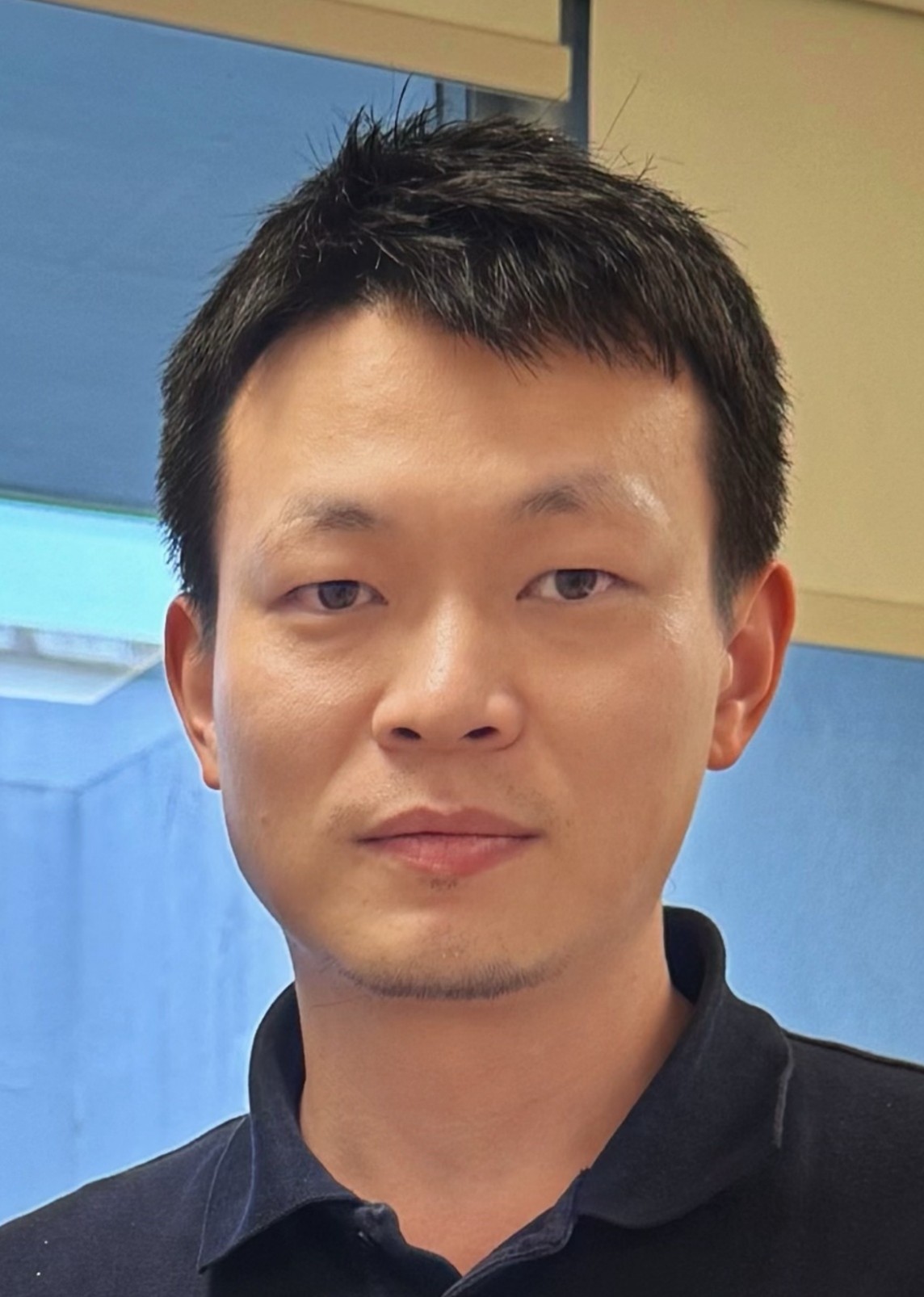
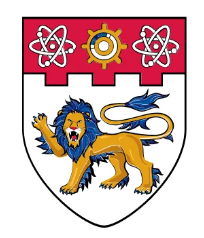 Assistant Professor, Nanyang Technological University
Assistant Professor, Nanyang Technological UniversityPhD, MICE, CEng, RGE(PRC)
The research team endeavors to (1) develop efficient machine-learning algorithms to bridge the gap between sparse data and smart city applications, and (2) enhance our fundamental understanding of the thermodynamics of energy systems and the thermomechanical interactions with various geotechnical infrastructure. The ultimate goal is to apply these developed technologies to improve the efficiency and resilience of urban and offshore infrastructure, including reclamation, excavation, piling, slope stability, and ground improvement.
Our interests include soil mechanics, machine learning of geo-data, centrifuge modelling and numerical analysis of soil-structure interaction, and geo-energy system. The recruitment of PhD students, Research Assistants, and Postdocs is ongoing. Interested candidates are always welcome to contact Dr. Shi.
Warning
Problem: The current name of your GitHub Pages repository ("Solution: Please consider renaming the repository to "
http://".
However, if the current repository name is intended, you can ignore this message by removing "{% include widgets/debug_repo_name.html %}" in index.html.
Action required
Problem: The current root path of this site is "baseurl ("_config.yml.
Solution: Please set the
baseurl in _config.yml to "Education
-
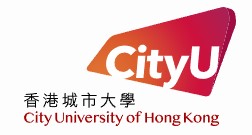 City University of Hong KongPh.D. in Civil EngineeringSep. 2019 - Feb. 2022
City University of Hong KongPh.D. in Civil EngineeringSep. 2019 - Feb. 2022 -
 City University of Hong KongM.Sc. in Financial Mathematics and Statistics (Distinction)Sep. 2018 - Jun. 2019
City University of Hong KongM.Sc. in Financial Mathematics and Statistics (Distinction)Sep. 2018 - Jun. 2019 -
 Hong Kong University of Science and TechnologyM.Phil. in Civil EngineeringSep. 2012 - Jan. 2015
Hong Kong University of Science and TechnologyM.Phil. in Civil EngineeringSep. 2012 - Jan. 2015 -
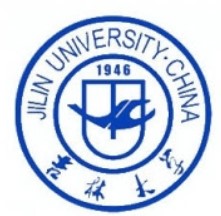 Jilin UniversityB.Eng. in Civil Engineering (Ranking 1st out of 220)Sep. 2008 - Jun. 2012
Jilin UniversityB.Eng. in Civil Engineering (Ranking 1st out of 220)Sep. 2008 - Jun. 2012
Honors & Awards
-
Editor's Choice by Canadian Geotechnical Journal2025
-
Editor's Choice by Geodata and AI2025
-
CoE Research - Young Faculty Award (Special Mention)2024
-
CEE Special Contribution Award2024
-
Bright Spark Lecture Award from ISSMGE2024
-
Thomas A. Middlebrooks Award from ASCE2023
-
Early Career Award by Geotechnique2023
-
Young Scholar Award, ACUUS2023
-
R.M. Quigley Awards (Honourable Mention) from CGJ2022
-
Hong Kong PhD Fellowship2019
-
Top Cited Paper Award, Geomechanics for Energy and the Environment2015
-
Energy Technology Concentration Award, HKUST2013
-
National Scholarship, Ministry of Education, China2009, 2011
News
Selected Publications (view all )
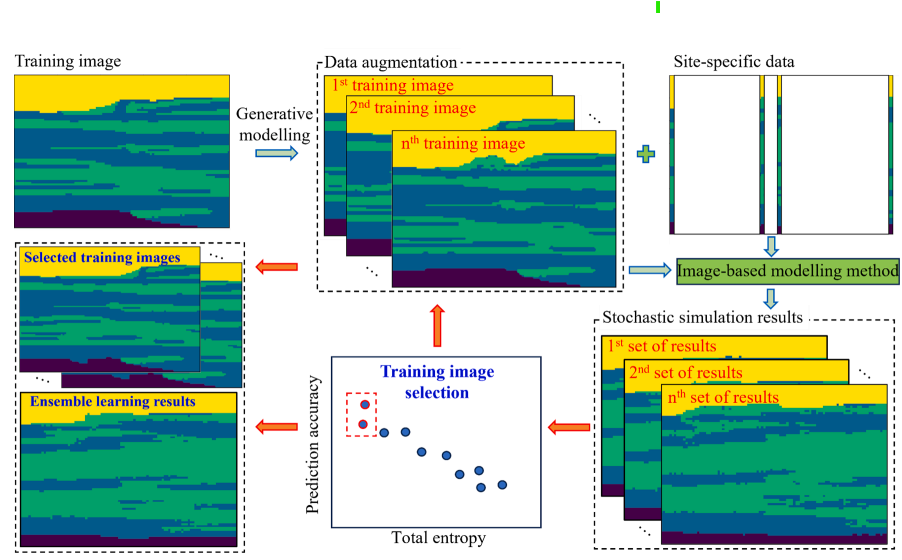
An ensemble learning paradigm for subsurface stratigraphy from sparse measurements and augmented training images
Chao Shi#, Yu Wang, Haoqing Yang (# corresponding author)
Tunnelling and Underground Space Technology 2024
A domain-specific training image database is first established using generative adversarial networks (GAN) that enable the generation of arbitrary sized image samples from a single training image. Subsequently, multiple qualified image samples that are compatible with site-specific data are adaptively selected and utilized for the ensemble learning of geological cross-sections.
An ensemble learning paradigm for subsurface stratigraphy from sparse measurements and augmented training images
Chao Shi#, Yu Wang, Haoqing Yang (# corresponding author)
Tunnelling and Underground Space Technology 2024
A domain-specific training image database is first established using generative adversarial networks (GAN) that enable the generation of arbitrary sized image samples from a single training image. Subsequently, multiple qualified image samples that are compatible with site-specific data are adaptively selected and utilized for the ensemble learning of geological cross-sections.
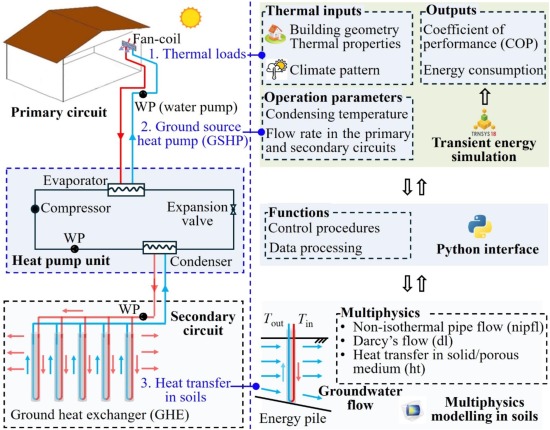
Dynamically coupled modelling of ground source heat pump systems considering groundwater flow and unbalanced seasonal building thermal loads
Yuanzhong Yan, Chao Shi, Gongsheng Huang, Yu Wang
Applied Thermal Engineering 2024
To properly evaluate the long-term COP of GSHP systems in cooling-dominated areas, a dynamically coupled simulation approach is proposed in this study. The proposed method integrates building thermal loads with ground heat transfer under groundwater seepage flow, within a unified framework.
Dynamically coupled modelling of ground source heat pump systems considering groundwater flow and unbalanced seasonal building thermal loads
Yuanzhong Yan, Chao Shi, Gongsheng Huang, Yu Wang
Applied Thermal Engineering 2024
To properly evaluate the long-term COP of GSHP systems in cooling-dominated areas, a dynamically coupled simulation approach is proposed in this study. The proposed method integrates building thermal loads with ground heat transfer under groundwater seepage flow, within a unified framework.

Data-driven forward and inverse analysis of two-dimensional soil consolidation using physics-informed neural network
Yu Wang, Chao Shi#, Jiangwei Shi, Hu Lu (# corresponding author)
Acta Geotechnica 2024
Although pure data-driven models demonstrate strong performance within their training domain, i.e., in-sample prediction, they lack interpretability and might have poor generalization outside the training domain, i.e., out-of-sample prediction, particularly when the observed geodata is limited. Moreover, these models often disregard valuable geotechnical domain knowledge. To address these limitations, a novel physics-informed neural network (PINN) is developed for both forward and inverse analyses of two-dimensional soil consolidations when only limited measurements are available.
Data-driven forward and inverse analysis of two-dimensional soil consolidation using physics-informed neural network
Yu Wang, Chao Shi#, Jiangwei Shi, Hu Lu (# corresponding author)
Acta Geotechnica 2024
Although pure data-driven models demonstrate strong performance within their training domain, i.e., in-sample prediction, they lack interpretability and might have poor generalization outside the training domain, i.e., out-of-sample prediction, particularly when the observed geodata is limited. Moreover, these models often disregard valuable geotechnical domain knowledge. To address these limitations, a novel physics-informed neural network (PINN) is developed for both forward and inverse analyses of two-dimensional soil consolidations when only limited measurements are available.
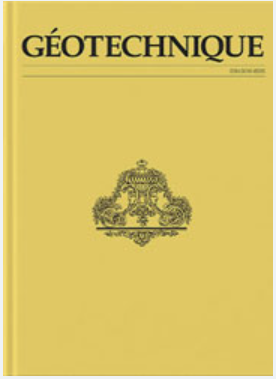
Data-driven spatio-temporal analysis of consolidation for rapid reclamation
Chao Shi, Yu Wang
Géotechnique 2023
In this study, a unified framework, capable of simultaneously modelling stratigraphic variation and spatial variability of soil properties through machine learning of limited site investigation data, is combined with the finite-element method and Monte Carlo simulation for spatio-temporal consolidation analysis of reclaimed lands.
Data-driven spatio-temporal analysis of consolidation for rapid reclamation
Chao Shi, Yu Wang
Géotechnique 2023
In this study, a unified framework, capable of simultaneously modelling stratigraphic variation and spatial variability of soil properties through machine learning of limited site investigation data, is combined with the finite-element method and Monte Carlo simulation for spatio-temporal consolidation analysis of reclaimed lands.